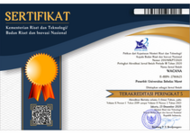Fear Of Missing Out dengan Problematic Internet Use pada Saat Pandemi Covid -19
Abstract
The COVID-19 pandemic has changed people's living habits, which indirectly makes internet use increase rapidly. The internet is an ideal place to meet the needs of connecting with others even though they are separated by distance. Continuous internet use can make someone experience Problematic Internet Use. However, the trigger for this problematic internet usage, is due to the fear of having a disconnected relationship with the people around which is known as the Fear of Missing Out. This study aims to determine the relationship between FoMO and PIU during the COVID-19 pandemic. The research method uses quantitative methods with a sampling technique convenience sampling. The respondents in this study were 200 who were 18-25 years old and used the internet or social media for more than 8 hours per day. The measuring instruments in this study were the Generelized Problematic Internet Use Scale 2 to measure PIU and the Fear of Missing Out Scale to measure FoMO. The data analysis uses Pearson Product Moment on SPSS 26 with results showing that there is a significant relationship between PIU and FoMO during the COVID-19 pandemic with the results of r = 0.388 and p = 0.000 (<0.05).
Keywords
Full Text:
PDF (Bahasa Indonesia)References
Abel, J. P., Buff, C. L., Burr, S. A. (2016). Social media and the fear of missing out: Scale development and assessment. Journal of Business & Economics Research, 14, 33-44. Alt, D. (2015). College students’ academic motivation, media engagement and fear of missing out. Computers in Human Behavior, 49, 111–119. Asosiasi Penyelenggara Jasa Internet Indonesia [APJII]. (2020). Laporan Survei Internet APJII 2019-2020 (Q2). Jakarta: Asosiasi Penyelenggara Jasa Internet Indonesia. Caplan, S. E. (2002). Problematic internet use and psychosocial well-being: Development of a theory-based cognitive–behavioral measurement instrument. Computers in Human Behavior, 18(2002), 553-575. Caplan, S. E. (2003). Preference for online social interaction. A theory of problematic internet use and psychosocial well-being. Communication Research, 30(6), 625-648. Caplan, S. E. (2010). Theory and measurement of generalized problematic Internet use: A two-step approach. Computers in Human Behavior, 26, 1089-1097. Czincz, J., & Hechanova, R. (2009). Internet addiction: Debating the diagnosis. Journal of Technology in Human Services, 27(4), 257-272. Firmansyah, Y. & Kardina, F. (2020). Pengaruh new normal ditengah pandemi covid-19 terhadap pengelolahan sekolah dan peserta didik. Jurnal Buana Ilmu, 4(2), 99-112. Franchina, V., Vanden, A. M., Van Rooij, A., Lo Coco, G., & De Marez, L. (2018). Fear of missing out as a predictor of problematic social media use and phubbing behavior among flemish adolescents. International Journal of Environmental Research and Public Health, 15(10), 2319. Gioia, F., Fioravantgi, G., Gasale, S., & Bourgsier, V. (2021). The effects of fear of missing out on people’s social networking sites use during the covid-19 pandemic: Relational closeness and individual’s online communication attitude. Frontiers in Psychiatry, 12, 1-11. Hootsuite. (2020). Digital 2020 Indonesia. Retrieved March 20 2021, from https://datareportal.com/reports/digital-2020-indonesia. Hootsuite. (2021). Digital 2021 Indonesia. Retrieved March 20 2021, from https://www.slideshare.net/DataReportal/digital-2021-indonesia-january-2021-v01. Intelligence, JWT. (2012). JWT: Fear of missing out (FOMO). Retrieved March 20 2021, from https://www.slideshare.net/jwtintelligence/the-fear-of-missing-out-fomo-march-2012-update. Islam, M. S., Sujan, M. S. H., Tasni, R., Ferdous, M. Z., Masud, J. H. B., Kundu, S., Mosaddek, A. S. M., Choudhuri, M. S. K., Kircaburun, K., & Griffiths, M. D. (2020). Problematic internet use among young and adult population in Bangladesh: Correlates with lifestyle and online activities during the covid-19 pandemic. Addictive Behaviors Reports, 12 (2020), 1-8. Jovic, J., Stefanovic, M. P., Voncina, M. M., Kostic, B. D., Mihaljovic, S., Ivkovic, M., Fiorillo, A., & Latas, M. (2020). Internet use during coronavirus disease of 2019 pandemic: psychiatric history and sociodemographics as predictors. Indian Journal of Psychiatry, 62. Access on March 23, 2020 from https://www.ncbi.nlm.nih.gov/pmc/articles/PMC7659784/. Kementrian Kesehatan RI. (2020). Pedoman Pencegahan dan Pengendalian Coronavirus Diasease (Covid-19). Jakarta: Kemenkes RI. Retrieved Maret 20 2021, from https://infeksiemerging.kemkes.go.id/download/REV-04_Pedoman_P2_COVID-19__27_Maret2020_TTD1.pdf. Przybylski, A. K., Murayama, K., Dehaan, C. R., & Gladwell, V. (2013). Motivational, emotional, and behavior correlates of fear of missing out. Computers in Human Behavior, 29, 1841-1848. Risdayanti, K. S., Faradiba, A, T., & Syihab, A. (2019). Peranan fear of missing out terhadap problematic social media use. Jurnal Muara Ilmu Sosial, Humaniora, dan Seni, 3 (1), 276-282. Shapira, N. A., Goldsmith, T. D., Keck, P. E., Khosla, U. M., & McElory, S. L. (2000). Psychiatric features of individual’s with problematic internet use. Journal of Affective Disorders 57, 267–272. Stoncience, G. J., Saudargiene, A., Pranckeviciene, A., Liaugaudaite, V., Bulanova, I. G., Simkute, D., Naginiene, R., Dainauskas, L. L., Ceidaite, G., Burkauskas, J. (2021). Impulsivity mediates association between problematic internet use, anxiety, and depressive symptoms in student: A cross sectional covid-19 study. Frontiers in Psychiatry 12, 1-8. WHO. (2020). Surface sampling of coronavirus disease (COVID-19): A practical “how to” protocol for health care and public health professionals. Retrieved Maret 22 2021, from https://www.who.int/publications/i/item/surface-sampling-of-coronavirus-disease-(-covid-19)-a-practical-how-to-protocol-for-health-care-and-public-health-professionals. WHO. (2019). ICD-11 for mortality and morbidity statistics. Retrieved Maret 22 2021, from https://icd.who.int/browse11/l-m/en. Young, K. S. (1999). Internet addiction: Symptoms, evaluation, and treatment. Professional Resource Exchange, Inc. Young, K. S. (2004). Internet addiction. American behavioral scientist, 48 (4). doi: 10.1177/0002764204270278. Yu, S. C., Chen, H. R., Liu, A. C., & Lee. H. Y. (2020). Toward covid-19 information: Infodemic of fear of missing out?. Healthcare, 8, 1-8.
DOI: https://doi.org/10.20961/wacana.v14i1.56585
Refbacks
- There are currently no refbacks.
Copyright (c) 2022 wacana

This work is licensed under a Creative Commons Attribution-ShareAlike 4.0 International License.
Jurnal WACANA
Fakultas Psikologi Universitas Sebelas Maret (UNS)
Gedung D Fakultas Psikologi
Jl. Ir. Sutami 36A Kentingan, Jebres, Surakarta Jawa Tengah 57126
email : wacana@mail.uns.ac.id






